Guest Artists Summer Camp 2025
In Person in Stockton California!
- Ed Austin – Classic Dances
- Sonia Dion & Cristian Florescu – Dances of Romania
- Roo Lester – Spanish Basque Dances
- Richard Powers & Emily Saletan – American & European Partner Dances
- Stacy Rose – Contras, Squares & Mixers
- Richard Schmidt – Couple Dances of Poland
- Andy Taylor – Dances from Carpathian Europe
Ed Austin 💖 Classic Dances
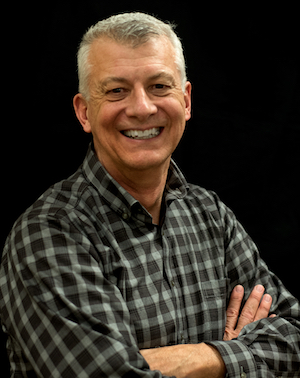
Edwin G. “Ed” Austin, Jr. served as the Artistic Director of the world-renowned BYU International Folk Dance Ensemble (IFDE) for 27 years, from 1985 to 2011, and now holds the title of Professor Emeritus of Dance at Brigham Young University.
A native of Laguna Beach, California, Ed’s introduction to folk dancing began in the 1960s when a high school teacher introduced him to a local international folk dance group. Raised in a home where music was always present, Ed’s passion for cultural dance grew alongside his love for the arts. As a university student, he performed with the BYU International Folk Dance Ensemble, where he met his sweet wife, Vickie. Together, they have three sons and 11 grandchildren. Ed loves the ocean, lives in the mountains, speaks Samoan, and plays the bones.
In addition to his role as Artistic Director of the BYU IFDE, Ed taught various folk dance courses, including those in dance ethnology/ethnochoreology, until his retirement in 2018. His expertise spans the globe as a producer, director, choreographer, master teacher, and cultural dance specialist. His creative works have been shared with audiences in more than 40 countries. For over two decades, Ed and Vickie co-directed the BYU Cougar Clogging Classic, a popular BYU dance camp focused on Appalachian clogging and percussive dance.
Ed’s influence extends far beyond teaching and choreography. With more than 30 years of experience as a dance adjudicator, he has judged at both national and international dance competitions. He also served two terms as president of the National Folk Organization of the United States (NFO). His research has taken him to the Appalachian Mountains, Wales, and the Samoan Islands.
Most recently, Ed and Vickie served missions for The Church of Jesus Christ of Latter-day Saints living in Serbia (2019–2021) and France (2022–2024), where, in addition to their other assignments, they taught dance to people of all ages throughout Europe.
Sonia Dion & Cristian Florescu 💖 Dances of Romania
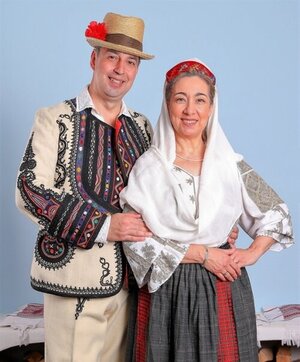
Sonia and Cristian are known for their vibrant energy, warmth and exciting choice of dances and music.
Cristian Florescu was born in Bucharest, Romania. He started dancing in 1982 with different Romanian folk ensembles and studied with various specialists, including Theodor Vasilescu. Cristian was principal dancer with the National Ensemble Cununa Carpatilor. In 1990-91, he received his certificate as a recognized solo dancer and choreographer in the field of folklore from the Romanian Ministry of Culture and the ACAFR. In 1993, he joined Les Sortilèges, a professional folk dance company based in Montreal Canada, where he has danced, taught and choreographed. During his time in Canada, Cristian has acquired multiple skills in various dance forms, including modern dance, ballroom, jazz and tap, as well as French-Canadian and Irish step dancing.
Sonia Dion was born in Quebec and has been a professional dancer for over 20 years. She was lead dancer, choreographer and artistic director, among other roles for Les Sortilèges dance company; Canada’s oldest professional folk dance ensemble, with whom she developed several new productions. Sonia has toured worldwide and has been exposed to a wide range of dance techniques, including Romanian folk dance, Scottish Highland dancing, French-Canadian step dance and ballroom dance.
It was at Les Sortilèges that the two met and formed a professional and personal partnership. They have taught at L’École supérieure de Danse du Québec, and have been part of the Artists in the Schools program sponsored by the Quebec Ministry of Education.
In recent years, Cristian and Sonia have developed a specific interest in working with recreational folk dance groups. They’ve been teaching in Brazil, Canada and the United States, Europe (Austria, Belgium, England, Germany, Italy, Norway, Switzerland and the Netherlands), Asia (Hong Kong, Japan, Singapore and Taiwan) to share their love of Romanian folk traditions. They have taught workshops in Canada and the United States and choreographed Romanian suites for performing groups, including the world-renowned BYU Folk Dance Ensemble in Utah.
Roo Lester 💖 Spanish Basque Dances
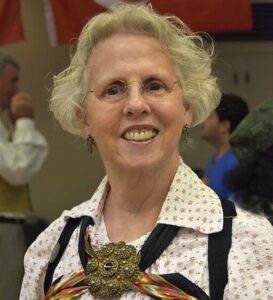
Roo Lester began folk dancing as part of rainy-day phys ed at school and hasn’t stopped since. A college folk dance class subsequently inspired her to pursue and complete a Master of Arts in Dance Ethnology from UCLA; she later turned toward a specialty in Scandinavian dance after taking a class in Norwegian folk dancing from Ingvar and Jofrid Sodal.
Since 1983, Roo has traveled extensively in Norway and Sweden, studying dance and participating in dance and music festivals, competitions and other events. Known in Scandinavia for her keen interest and knowledge of music, dance and cultural traditions, she has served as the American coordinator for several dance and music camps in Sweden and Norway. As a dance educator and ethnologist, Roo has taught Scandinavian dancing throughout the U.S. and beyond for many years and has published a number of articles on Norwegian dances, as well as a guide to Scandinavian Dance Basics.
Roo’s life work in dance has taken many interesting twists and turns, from teaching folk dance in the Los Angeles area public schools, to a 3-month research trip to Spain to study Basque dance. Roo was a director of Barátság Hungarian Music and Dance Camp, and for over 20 years has served as a director of Scandia Camp Mendocino. She had a stint in the television industry working on an episode of M*A*S*H called “Inga.” During the pandemic, Roo has worked with dance in a variety of ways over Zoom, both as a teacher and assisting other dance programs to reach widespread, house-bound audiences.
When she is not traveling, Roo lives in the southwestern suburbs of the Chicago metropolitan area with her husband and frequent dance partner, Larry Harding.
Richard Powers & Emily Saletan 💖 American & European Partner Dances
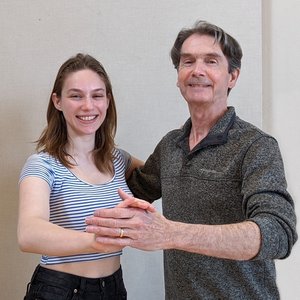
Richard Powers has taught 101 dances at Stockton Camp and is returning to teach at Stockton for the sixteenth time since 1988. Richard has taught dance in Paris, London, Rome, Venice, Prague, Vienna, Geneva, Seville, Edinburgh, Krakow, St. Petersburg, Moscow, Tokyo and Kyoto, including 29 workshops in France (teaching in French), 28 in Japan (teaching in Japanese), and 22 in Russia (not teaching in Russian). Richard is currently the full-time social dance instructor at Stanford University.
His principal focus since 1975 has been social dance forms, from the Renaissance to today. Specializations include 19th century American and European social dance, dances of the Ragtime Era and Jazz Ages, and currently evolving vernacular dance forms. His research is drawn from a personal collection of over 2,500 historic dance manuals, the largest personal collection in the world, supplemented with a twelve thousand-title collection of period dance music. Other resources include ongoing exchanges of information with dance historians in the U.S and Europe.
Richard has choreographed folk and vintage dance suites for many major companies, including AMAN Folk Ensemble, the Ethnic Dance Theatre of Minneapolis, the BYU Folk Ensemble, Ahmet Lüleci’s Collage Dance Ensemble in Boston, Westwind, the Narodno Folk Dance Ensemble, and the Beseda Dance Theatre in Prague.
Besides Stockton Folk Dance Camp, Richard has taught at many of the major dance workshops and camps, including Mainewoods, Pinewoods, the National Folk Dance Federation of Japan, several of California’s Statewide Festivals, Idyllwild, the Flurry Festival, Texas Camp, Mendocino Folklore Camp, and Buffalo Gap, as well as many regional folk dance groups.
Check out Richard Power’s website for more info. www.richardpowers.com
Emily Saletan has been dancing international folk dances all her life, since she was an infant! Emily taught international folk dance classes at Stanford throughout their undergraduate education, in which they studied neuroscience with minors in music and dance. They are now in a master’s program at Stanford focused on music, science, and technology, a flexible category that includes everything from performing audiology research at the Stanford Ear Institute to performing her own songs around campus. Emily first appeared at Stockton in 2022 as the band vocalist and is thrilled to be back partnering Richard’s classes. She extends infinite thanks to her dad, Tony Saletan, for his compassionate legacy of arts education.
Read more about Emily Saletan on her website: www.emilysaletan.com
Stacy Rose 💖 Contras, Squares & Mixers
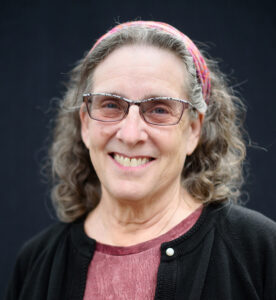
Stacy Rose, a long time SFDC camper, is a dedicated folk dance instructor based in Coos Bay, Oregon, with a rich background in traditional dance and music. Since 2009, she has been teaching international folk dance classes at Southwestern Oregon Community College, celebrating over 15 years of instruction.
Beyond her teaching, Stacy is an active member of the South Coast Folk Society, where she organizes events that promote traditional American music and contra dancing. Her efforts to unite communities through dance were highlighted in the documentary film “Take Hands,” which follows her work in organizing a week-long celebration of these traditions in Coos Bay.
In addition to her dance endeavors, Stacy is recognized as a traditional Jewish cook, baker, and musician, reflecting her diverse cultural heritage and commitment to preserving traditional arts.
Stacy’s passion for dance and community building continues to inspire many, fostering a deeper appreciation for folk traditions in the Coos Bay area and beyond.
Stacy will be calling contras, squares and mixers at camp.
Richard Schmidt 💖 Couple Dances of Poland
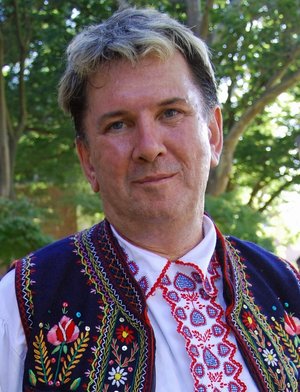
Richard Schmidt was introduced to folk dancing at the age of four when his father enrolled him in a local amateur Polish dance group in Montréal, Québec, Canada. His first teacher came from the theatre in Poland and she quickly taught him the discipline and entertainment value needed to be a performer. His next instructor had been a dancer with the Polish State Ballet Company Mazowsze. He recognized Richard’s talent, even at that age, took him under his wing, and taught him many tricks of the trade. Richard later joined the children’s group of the Podhale Folk Dance Company, in Montréal, and became the principal dancer.
At the age of seventeen, Richard took on the role of assistant choreographer and began learning the intricacies of teaching folk dancing, which he has been doing ever since. He traveled regularly to Poland to study under many of that country’s top folk dance specialists. He continued to dance and participate in numerous festivals and competitions in North America and Europe. As his reputation grew, he was soon invited to teach and choreograph for numerous folk ensembles in Canada and the United States, as well as at international dance camps.
He has choreographed for and taught folk ensembles in Europe and North America since his teens and he is much sought after on the international folk camp circuit both in the Americas and Asia. In 2010, Richard began work with the world-renowned Lechowia Polish Dance Company of Mississauga, Ontario. With over 300 dancers, the ensemble is by far one of Canada’s largest and strongest representatives of Polish and Canadian culture.
Richard Schmidt received the Lifetime Achievement Award from the Polish government for his dedication in promoting Polish culture abroad. He is the Founder and Artistic Director of “The White Eagle Folk Dance Academy” in his hometown of Montreal, Canada, as well as, the Artistic Director for The Lechowia Polish Folk Dance Company of Toronto.
This will be Richard’s fifth appearance on the Stockton teaching staff.
Andy Taylor 💖 Dances from Carpathian Europe
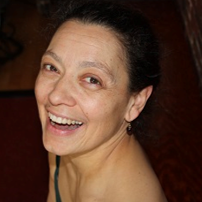
Andy Taylor started International Folk dancing at a young age under the guidance of her parents, Marianne and Conny Taylor, cofounders of the Folk Arts Center of NE. Her mother, Marianne Taylor, was on Staff at Stockton many times.
Andy was certified in Scottish Country Dance at 17 and graduated with a BFA in dance and a minor in Social Anthropology. She continues to teach International Dance in schools through Dance Collective/ Mass Movement & BalletRox through residencies. Andy is the artistic director of Mladost Folk Ensemble, which she founded upon the death of her father in 2006 and continues in the spirit of her parents’ work. She recorded and produced a CD of Austrian jodels printed in a book by Werner von Trapp and produced by Conny Taylor.
Since the beginning of the pandemic, Andy’s generous students have stepped up and assisted her to get on Zoom. She has continued as artistic director to the Wheaton College Dance Company on Zoom. In addition, she teaches her youth performing group, Mladost Folk Ensemble, both virtually and returning to in-person. They have produced two video collages. Her intergenerational group, Back Pocket Dancers, have finished one video for virtual festivals but look forward to an in-person performance in Sep. 2021 at the Dance for World Community Festival in Cambridge, MA.
Andy has continued to teach both her Modern 55+ and Modern/Jazz classes online and has begun to teach select classes in-person. She has taught Focus on Form virtual classes for the RSCDS NoVA and Boston Branches. These classes help dancers to get ready for the physical demands of in-person dances. The silver lining for Andy and the Tuesday Community Dance is that they have been welcoming participants from all over the world, just as Stockton and so many other festivals and local dances have done.
Andy will be teaching a unique group of dances from Carpathian Europe. These dances were collected in the 1890s by an Austro-Hungarian soldier who served the Carpathian and Galician regions. He taught the dances to his son, who passed them on to his own son, folk dancer and instructor Michael Protenic. Mike rediscovered the inherited dance instructions in 2009 and spent the next several years reconstructing the figures and finding the music that would reflect the steps and spirit of the dances.
These are primarily the dances of the Carpatho-Rusyn communities, (Prešov Slovak, Lemko, Boyko and Hutsul ethnic groups – although the “Hutsuls” would rather be known as гірські люди – girsky lyǒde – mountain people), stateless peoples too often left out of history. The destruction of World Wars 1 and 2 tore many of these communities and their cultures apart, with emigration adding to the loss. Andy is honored to introduce these dances to the folk dance community for the first time.
